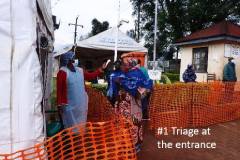What Factors Prevented the Spread of COVID-19 and How COVID-19 Impact Victims of Violence: Research Results Presented at the 2022 Annual Meeting of the Japanese Society of Public Health
2023.01.06
The 81st Annual Meeting of the Japanese Society of Public Health was held for three days from October 7 to 9, 2022 in Yamanashi Prefecture. Research Fellow Komasawa Makiko and Visiting Fellow Shirayama Yoshihisa (Associate Professor at Juntendo University) of the JICA Ogata Sadako Research Institute for Peace and Development participated and presented the results of ongoing research in Uganda and Bhutan. Over 2,200 practitioners, researchers, and students gathered at the meeting to discuss their experiences in responding to COVID-19 and public health in the post-COVID-19 era under the theme of innovations in public health.

Temperature check at the entrance of a hospital
Komasawa gave a presentation titled “Factors Which Controlled COVID-19 in Uganda: A Qualitative Study in Regional Referral Hospitals.” The number of COVID-19 positive cases and deaths in Uganda is lower than the African average, and the country is recognized as having controlled its pandemic. Therefore, in Uganda, a country where medical resources are limited, Komasawa examined the factors which lowered the spread of COVID-19 infection through efforts of regional referral hospitals, which fulfilled a central role in responding to COVID-19 infection.
In this research, Komasawa conducted interviews at four regional referral hospitals from March to April 2022, and analyzed the interview results. Komasawa and her team identified four main factors which curbed the spread of pandemic: (1) basic control measures, such as surveillance/testing, reporting systems for infectious diseases had been in place since before COVID-19, (2) the Ugandan Ministry of Health and WHO promptly provided technical instruction and support with manpower, goods, and funds from the beginning of the pandemic, (3) despite the spread of nosocomial infections, healthcare workers were able to hold on with a small number of staff and continue to provide regular services, and (4) existing community mechanisms enabled early detection and response (testing, isolation, treatment, etc.). These were essential factors for building a resilient health system, and they found that these factors were secured at the regional referral hospitals in Uganda.
Even in an environment with fundamental constraints on medical and human resources, under the leadership of the government, the basic components of a resilient health system can be strengthened by maximizing utilization of the existing capacity of medical settings and communities. Komasawa pointed out the importance of strengthening the components necessary for providing health services and learning how to respond to emergencies at each health facility during normal times.
Shirayama conducted a secondary analysis titled “COVID-19 Pandemic and Victims of Violence” of the data from the “COVID-19 Impact on Women and Children Study,” a survey conducted in 2021 by JICA, the Bhutanese government, and UN agencies. Shirayama examined the degree of increase in victims of violence under lockdown and related factors. The survey respondents were 8,048 men and women aged 18 and over in Bhutan. 63.7% of respondents were women and 51.2% were illiterate. 49.6% had a monthly household income of approximately 8,500 to 34,000 yen (according to the 2000 Bhutan Household Income Survey, the average monthly income per capita was 2,040 yen; 1 Nu = approx. 1.7 yen). 55.7% of respondents reported a decrease in income due to the COVID-19 pandemic.
Results for victims of violence indicated that 134 people (1.7%) had been victims of physical violence since the outbreak of the pandemic. 57.5% of respondents reported that the violence was triggered by alcohol consumption, followed by 26.9% for decreased income. Additionally, 48.2% of respondents who had suffered from violence prior to the pandemic (134 people) answered that violence increased during the pandemic. When compared by gender, domestic physical violence against women increased significantly.
Regarding victims of psychological violence, 35.4% of respondents who had suffered from psychological violence before the pandemic (556 people) reported that they continued to suffer even after the start of the pandemic. Among these respondents, 21.5% reported that psychological violence toward partners had increased compared to before the pandemic. Psychological and economic violence were found to increase more among illiterate respondents.
In Bhutan, COVID-19 lockdowns and school closures have increased physical, psychological and economic violence, highlighting differences by gender and education level. Shirayama concluded by stating that further research is needed.

事業事前評価表(地球規模課題対応国際科学技術協力(SATREPS)).国際協力機構 地球環境部 . 防災第一チーム. 1.案件名.国 名: フィリピン共和国.

事業事前評価表(地球規模課題対応国際科学技術協力(SATREPS)).国際協力機構 地球環境部 . 防災第一チーム. 1.案件名.国 名: フィリピン共和国.

事業事前評価表(地球規模課題対応国際科学技術協力(SATREPS)).国際協力機構 地球環境部 . 防災第一チーム. 1.案件名.国 名: フィリピン共和国.

事業事前評価表(地球規模課題対応国際科学技術協力(SATREPS)).国際協力機構 地球環境部 . 防災第一チーム. 1.案件名.国 名: フィリピン共和国.

事業事前評価表(地球規模課題対応国際科学技術協力(SATREPS)).国際協力機構 地球環境部 . 防災第一チーム. 1.案件名.国 名: フィリピン共和国.
scroll